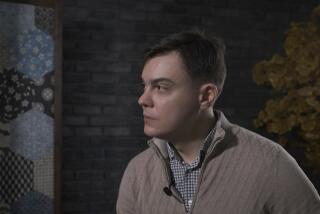Architect of Soviet Reform Angrily Denies Ties to CIA
- Share via
MOSCOW — Alexander N. Yakovlev, known in Russia as “the architect of perestroika ,” lashed out Wednesday against KGB allegations that during all the years he served in the Kremlin, he was actually working for the CIA.
In a furious rejoinder carried in the liberal weekly Literaturnaya Gazeta, Yakovlev skewered the former chief of the defunct KGB, Vladimir Kryuchkov, who had accused Yakovlev, in book excerpts published last week, of being a spy for the United States.
“A bigger brown-noser than V. Kryuchkov . . . never existed,” Yakovlev, once former President Mikhail S. Gorbachev’s closest ally, was quoted as saying. He also accused Kryuchkov of instigating political violence in the former Soviet Union and of trying to prolong Soviet military involvement in Afghanistan.
Normally a courtly man, who is considered the most powerful brain behind Gorbachev’s reforms, the 69-year-old Yakovlev was enraged by Kryuchkov’s attack and said he will demand a public investigation into the allegations so that his name could be cleared.
Kryuchkov already faces trial in April on treason charges for his role in the coup attempt of August, 1991. Many believe the plump-faced Kryuchkov was actually the mastermind of the putsch.
In book excerpts published in Sovietskaya Rossiya, a conservative daily, Kryuchkov cited information he received through “intelligence channels” that “an American representative” had met with Yakovlev in 1990 to tell him that the West “expected more from him” in his fights against Soviet hard-liners. “Professionals know well that such an instruction is given to those who have already agreed to work for an intelligence service but for some reason avoid assignments or aren’t active enough,” Kryuchkov wrote.
He claimed the KGB--a feared institution of domestic and international spying that Russian reformers hope they have dismantled--had begun to suspect Yakovlev back in 1960 when he had been an exchange student at Columbia University and was observed in unauthorized contacts with Americans.
Kryuchkov also condemned Yakovlev’s overall political beliefs, claiming that he had long hated the Soviet Communist system even as he hypocritically served it. Beneath his various masks, Kryuchkov alleged, Yakovlev was “an evil genius, a fatal figure in our history!”
Kryuchkov’s charges were no more outrageous than frequent hard-line attacks on Gorbachev himself and his team of reformers. But they carried a certain sting, coming from the former KGB chief and directed against the man who was once arguably the second-most-powerful in the Soviet Union.
Yakovlev, speaking to Literaturnaya Gazeta’s New York correspondent during a trip to the United States that, he said, would probably also be used as proof of his disloyalty, denied virtually all aspects of Kryuchkov’s story.
Critical of the KGB since he served as Soviet ambassador to Canada from 1973 to 1983, Yakovlev said that “Kryuchkov has always been a master of provocations.”
More to Read
Sign up for Essential California
The most important California stories and recommendations in your inbox every morning.
You may occasionally receive promotional content from the Los Angeles Times.












